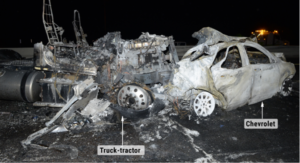Crash highlights need for fatigue management and more action on collision avoidance and connected vehicle technologies
WASHINGTON (March 28, 2023) – A program to manage driver fatigue in agricultural transportation and collision avoidance technology would have prevented a fatal 2021 multivehicle collision in Phoenix where a tractor-trailer carrying milk crashed into stopped traffic, the NTSB said at its virtual public board meeting Tuesday.
“Generally, motor carriers must make a compelling safety case before regulators will grant them an exemption from safety rules. But, once Congress mandated and then expanded the agricultural hours-of-service exemption, the oversight of the carriers’ fatigue risk largely disappeared,” said NTSB Chair Jennifer Homendy. “Drivers operating under an hours-of-service exemption are at a greater risk of fatigue: an unacceptable — and avoidable — danger to every road user.”
The board met to discuss the findings and recommendations of an investigation into the multivehicle crash on June 9, 2021 that killed four and injured 11.
Following the initial impact, the milk truck crossed the eastbound travel lanes, struck a concrete median barrier and separated. The truck cab and one passenger vehicle were consumed by fire. Video footage showed the truck driver was facing forward before the crash and did not slow down as he approached the line of cars. Investigators found the driver had less than a six-hour opportunity for sleep the day of the crash and regularly worked 70 – 80 hours per week.
The trucking company, Arizona Milk Transport, operated under an “hours-of-service exemption” that allows unlimited driving hours for certain agricultural commodities within a 150 air-mile radius. Investigators said the safety impact of the hours-of-service exemption is unknown, as is the prevalence of its use, and called for more data.
Although exempted from hours of service, Arizona Milk Transport did not have a program to manage driver fatigue. The investigation found the company had poor oversight over its drivers and did not enforce its own policies regarding the maximum hours employees could work.
The NTSB called for the U.S. Department of Transportation to study the prevalence of driver fatigue in companies operating under the exemption and require them to seek authority to implement a fatigue management program. The NTSB also recommended milk industry associations encourage their members to adopt a fatigue management program.
In addition, the NTSB reiterated multiple recommendations on collision avoidance technology that would have prevented this crash from occurring in the first place. This includes recommendations to NHTSA to develop standards for forward collision avoidance systems in commercial vehicles and mandate connected vehicle technology on all new vehicles.
Further, the NTSB voted to reclassify two recommendations to the U.S. DOT and the Federal Communications Commission related to connected vehicle or vehicle-to-everything implementation. The NTSB changed the recommendations’ status to “open, unacceptable response” due to the lack of progress. The responses had been classified “open, await response.”
Vehicle-to-everything, or V2X, technology allows vehicles and infrastructure to relay important safety information to other vehicles to avoid crashes. The NTSB currently has 14 open recommendations related to collision avoidance systems and V2X technologies and the issue is on its Most Wanted List of Transportation Safety Improvements.
The executive summary, probable cause, findings, and safety recommendations are in the report abstract available on the investigation web page. The final report will be published on the NTSB website in several weeks.
The public docket for the investigation includes more than 1,800 pages of factual information, including reports, interview transcripts, and other investigative materials.
McCraren Compliance can help you understand and comply with FMCSA, USDOT and ADOT and ensure your drivers and your vehicles operate safely and efficiently.
Call us Today at 888-758-4757 or email us at info@mccrarencompliance.com to schedule your free FMCSA Compliance Assessment.



